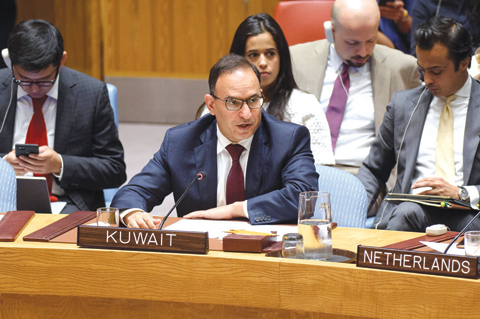Kuwait condemns terrorism in Africa's Sahel
 NEW YORK: Kuwait’s Permanent Representative to the United Nations Ambassador Mansour Al- Otaibi addresses the Security Council. — KUNA
NEW YORK: Kuwait’s Permanent Representative to the United Nations Ambassador Mansour Al- Otaibi addresses the Security Council. — KUNANEW YORK: Kuwait, affected by climate change, will spare no effort on all levels to tackle its adverse effects, believing also that facing this phenomenon is a shared responsibility. This came in Kuwait's Permanent Representative to the United Nations Ambassador Mansour Al-Otaibi speech during the Security Council session on International Peace and Security with Focus on Climate-Related Security Risks. Climate change is a major concern for the world's population, as for its harmful impacts, which is one of the biggest challenges in the current era because it threatens the security and existence of many countries and warns of a humanitarian disaster, Otaibi said.
"Nobody is safe," Otaibi said, referring to the dangers of this changing phenomenon, and while the Council may not be the ideal forum to tackle the phenomenon of climate change, its input is valuable. Combating climate change requires a coordinated approach, he added. Despite the myriad efforts taken, the path ahead is long. Political will, cooperation and international solidarity are all essential, he added.
Otaibi stressed efforts of the Council are an integral part of the efforts of other United Nations bodies and agencies to consider and address climate change, including its possible implications for security. Those efforts based on requirements, principles and provisions of the United Nations Framework Convention on Climate Change, the Kyoto Protocol and the Paris Agreement.
Otaibi recalled the causes and consequences of climate change such as drought, desertification, famine, political turmoil, disputes over natural resources, mass exodus, hurricanes, floods, severe heat waves, high water levels and food insecurity. Developing countries are making extraordinary efforts to address climate change and enhance their capacity to adapt to climate change; especially the least developed among them, as well as small island states and a number of African countries.
Kuwait also fiercely condemned terrorist acts targeting the safety and security of Africa's Sahel region, namely carried out by groups like Boko Haram and the so-called Islamic State. Otaibi underlined Kuwait's support of governments in their efforts to tackle terrorism and economic challenges. During a session discussing the role of women and security in the Sahel, he said this was faced with numerous challenges.
These include challenges to the environment, which subsequently affect food security, economic, like unemployment, and security, like terrorism. Women, in particular, are affected by these challenges due to their situation, he said. Terror groups, through recruitment, target women, he said. This is why the UN needs to employ more and more women throughout its peace-preserving missions. He commended the UN's role in enhancing the role of women in these efforts, most recently after the organization increased their participation in a mission aimed at stability in Mali by 22 percent.
The UN has also placed women's empowerment on its priority list as part of a strategy aimed the Sahel. The Kuwaiti envoy also praised the "crucial role" played by the African Union in leading peace missions, describing this as an extremely important means to respond to disputes and crises in Africa. There is an opportunity to increase the role of African women in efforts to achieve security and sustainable peace on the continent, he underlined. - KUNA










